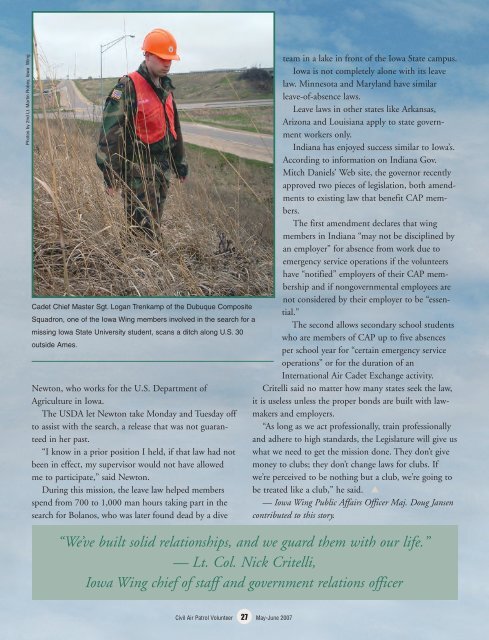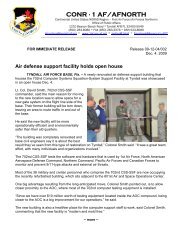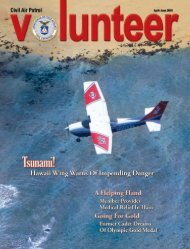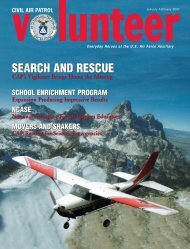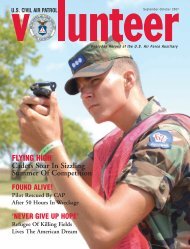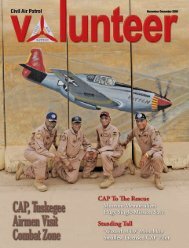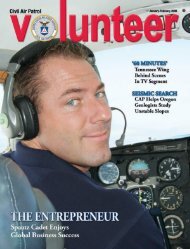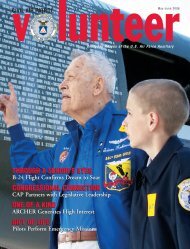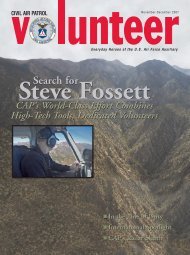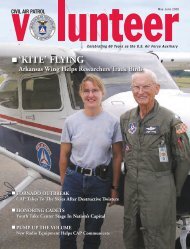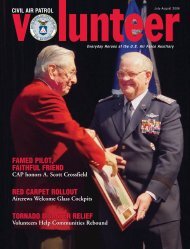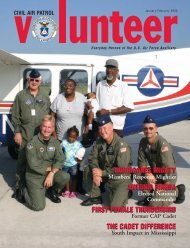CAPITAL CLOSE-UP
Hi-res - CAP VolunteerNow
Hi-res - CAP VolunteerNow
- No tags were found...
You also want an ePaper? Increase the reach of your titles
YUMPU automatically turns print PDFs into web optimized ePapers that Google loves.
Photos by 2nd Lt. Martin Robey, Iowa Wing<br />
Cadet Chief Master Sgt. Logan Trenkamp of the Dubuque Composite<br />
Squadron, one of the Iowa Wing members involved in the search for a<br />
missing Iowa State University student, scans a ditch along U.S. 30<br />
outside Ames.<br />
Newton, who works for the U.S. Department of<br />
Agriculture in Iowa.<br />
The USDA let Newton take Monday and Tuesday off<br />
to assist with the search, a release that was not guaranteed<br />
in her past.<br />
“I know in a prior position I held, if that law had not<br />
been in effect, my supervisor would not have allowed<br />
me to participate,” said Newton.<br />
During this mission, the leave law helped members<br />
spend from 700 to 1,000 man hours taking part in the<br />
search for Bolanos, who was later found dead by a dive<br />
team in a lake in front of the Iowa State campus.<br />
Iowa is not completely alone with its leave<br />
law. Minnesota and Maryland have similar<br />
leave-of-absence laws.<br />
Leave laws in other states like Arkansas,<br />
Arizona and Louisiana apply to state government<br />
workers only.<br />
Indiana has enjoyed success similar to Iowa’s.<br />
According to information on Indiana Gov.<br />
Mitch Daniels’ Web site, the governor recently<br />
approved two pieces of legislation, both amendments<br />
to existing law that benefit CAP members.<br />
The first amendment declares that wing<br />
members in Indiana “may not be disciplined by<br />
an employer” for absence from work due to<br />
emergency service operations if the volunteers<br />
have “notified” employers of their CAP membership<br />
and if nongovernmental employees are<br />
not considered by their employer to be “essential.”<br />
The second allows secondary school students<br />
who are members of CAP up to five absences<br />
per school year for “certain emergency service<br />
operations” or for the duration of an<br />
International Air Cadet Exchange activity.<br />
Critelli said no matter how many states seek the law,<br />
it is useless unless the proper bonds are built with lawmakers<br />
and employers.<br />
“As long as we act professionally, train professionally<br />
and adhere to high standards, the Legislature will give us<br />
what we need to get the mission done. They don’t give<br />
money to clubs; they don’t change laws for clubs. If<br />
we’re perceived to be nothing but a club, we’re going to<br />
be treated like a club,” he said. ▲<br />
— Iowa Wing Public Affairs Officer Maj. Doug Jansen<br />
contributed to this story.<br />
“We’ve built solid relationships, and we guard them with our life.”<br />
— Lt. Col. Nick Critelli,<br />
Iowa Wing chief of staff and government relations officer<br />
Civil Air Patrol Volunteer 27 May-June 2007


